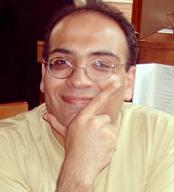Legitimacy and Civil Society
Here's a different take on Iranian government and politics.
Legitimacy and civil society are key concepts in the essay quoted below by Mehdi Khalaji [at right], a Shiite theologian trained in Qom and at the Sorbonne, who is the author of The Last Marja: Sistani and the End of Traditional Religious Authority in Shiism and is currently a visiting fellow at the Washington Institute for Near East Policy. It was published on the Project Syndicate web site.
Can your students explain the argument Khalaji is making about the capture of the religious elements of Iran's civil society and subsequent loss of legitimacy by the government? I think you ought to ask them a concept-based, FRQ-type question or two based on this opinion piece.
Another understanding that this article might help students see is the revolutionary nature of Khomeini's "guardianship" ideas. The most senior clerics in Iran still don't accept that and refrain from participating in government or politics. The "political clerics" are younger and less educated and perhaps more secular than their elders.
(See Towards an Understanding of the Shiite Authoritative Sources by Dr. Mohamed Al-Saeed Abdul Mo'men and Fataawaa of Muslim Scholars on Khomeini by Wageih al-Madani.)
Iran’s Political Clerics
"Iran’s theocratic regime appears more confident than ever... But... the regime’s authority is in fact built on insecure foundations.
"The 1979 revolution, which ended Iran’s monarchical tradition, created a new political order based on Shiite theological foundations and giving absolute ruling power to a Shiite jurist/cleric. Throughout Iran’s long history, Shiite seminaries exercised great influence on Iranian society and politics, but they had been considered civil institutions. It was not until the Iranian revolution that the seminary establishment came to be considered a source of political legitimacy.
"The change followed Ayatollah Khomeini’s theory of the 'jurist-ruler.' In Khomeini’s view, the jurist-ruler could modify religious laws, depending on his interpretation of the needs of the regime. As a result, religious interpretation – previously, a highly decentralized function undertaken by various seminaries – was concentrated in the hands of a political leader. Accordingly, the seminary establishment was no longer a civil structure managing only religious affairs, but instead developed into a unified, ideological party serving the interests of the regime.
"That transformation was far-reaching. Traditionally, Shiite seminaries were rather unorganized, unstructured places, based on pre-modern styles of management. The concept of a decentralized religious establishment is difficult for Westerners to understand, given the highly structured administrative framework of Christian churches and ecclesiastical orders. But this fluid hierarchy, an absence of written rules and organizational order, allowed the various seminaries – and their different interpretive traditions – to survive despotic political regimes and resist intervention by different dynasties and monarchies...
"By 'modernizing' the seminaries following a single-party model, the revolutionaries gained control over them. The seminaries became little more than an extension of the political system.
"The death of Ayatollah Khomeini – and that of other religious authorities ( marjas ) like Ayatollah Abul Qassem Khoi in Najaf, Iraq – marked the end of the ideal of a ruler who had mastered both religion and politics. Iran’s current supreme ruler, Seyyed Ali Khamenei, whose religious degree was a focus of suspicion in the seminary and among the clerical elite, was not considered a jurist by merit. Consequently, Khamenei’s evident lack of religious legitimacy has pushed the government to assume full control over the clerical establishment, further depriving the seminaries of their historical independence.
"Ironically, it seems that theocratic theory in Iran has led to anti-theocracy. With the seminaries politicized and their independence greatly reduced, the religious establishment is no longer in a position to confer political legitimacy on the regime. Nor can it exercise its traditional functions in the religious sphere to provide support to civil society in the country..."



0 Comments:
Post a Comment
<< Home